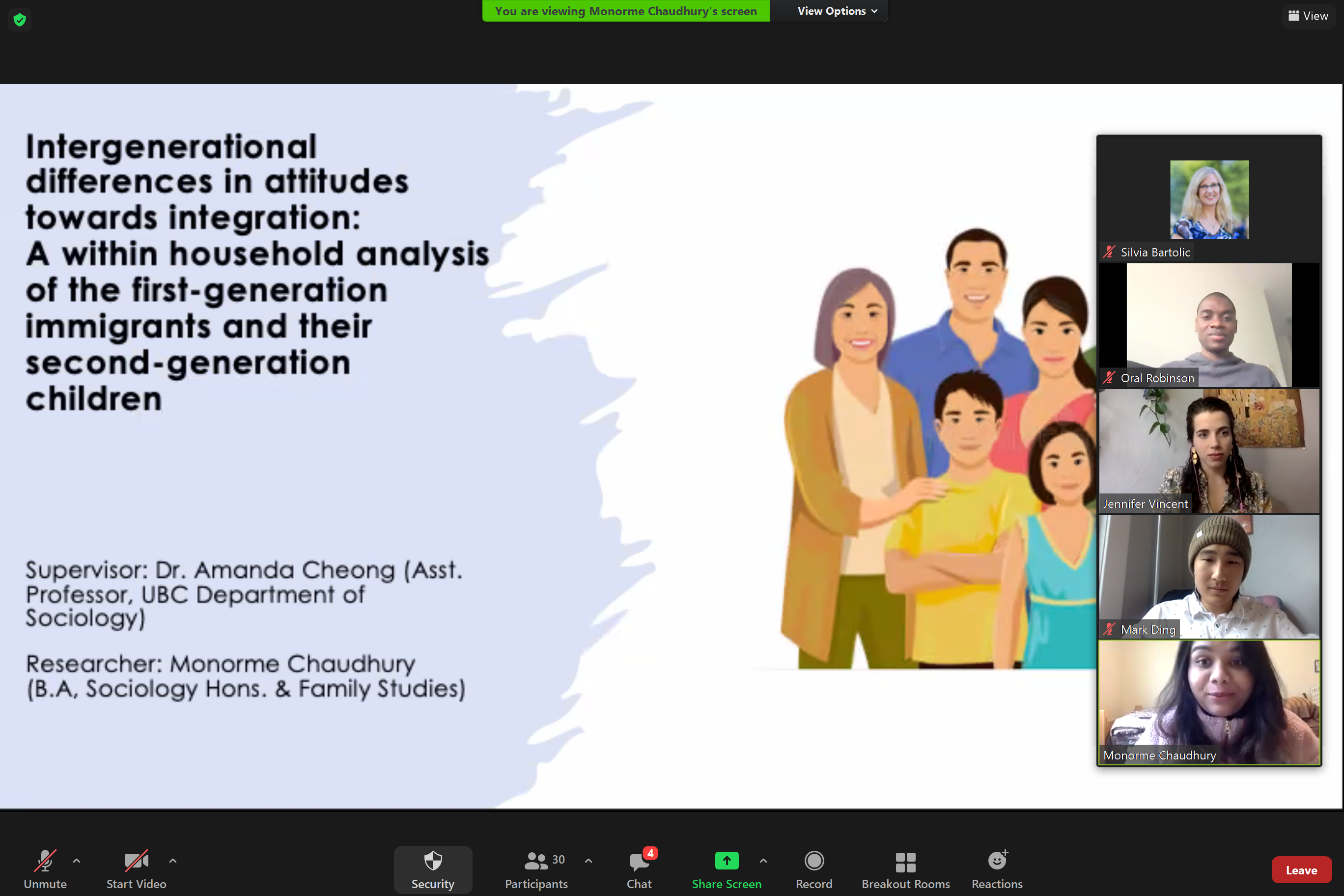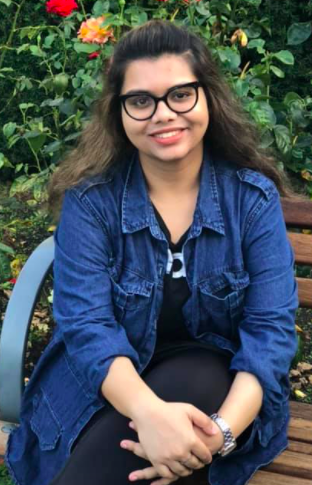Monorme Chaudhury is a fourth-year student pursuing an Honours in Sociology and a minor in Family Studies. She is a first-generation immigrant in Canada and over the past four years, her active involvement within the UBC community, in Vancouver as well as her international work experience in Brazil has shaped her academic interests. Her research interests include family and life, race, ethnicity and immigration, and social inequality.


What was your project about? What are the main takeaways from your work?
My project titled, “Intergenerational differences in attitudes towards integration: A within household analysis of the first-generation immigrants and their second-generation children” is a qualitative study that explores the lives of first-generation immigrants and their second-generation children within the South Asian diaspora in Canada. The key findings of this study were:
Beliefs and values that shape the lives of the two generations:
- The first-generation immigrant parents bring with them a wealth of experiences such as their family values and traditions which they impart on to their second generation. Their second generation, who are born and raised in Canada, often adapt to the dominant culture as well as adhere to family traditions that shape their bicultural identity. However, the second-generation young adults also influence their parents’ understandings of the normative practices within the Canadian culture in efforts to facilitate the integration process, as well as adhere to cultural values that are a critical aspect of the South Asian identity.
- The impact of human capital on the second generation youth: Human capital is an integral part of the first generation parents’ identity which consists of their education qualifications, professional experiences, cultural values, and economic capital from their host country. These are influential factors that shape their educational attainment and socioeconomic success of the second-generation youth raised in Canada.
- Identity negotiation as an integral communication strategy: In order to mitigate intergenerational conflict, second-generation young adults often adopt separate identities within different social institutions and their private family lives to adhere to familial expectations that facilitate better communication with their parents. However, this often resulted in cultural dissonance for a few second-generation participants, while others demonstrated a strong understand of their individual identity to adhere to their South Asian cultural values and integrate within the western cultural context.
The findings of this research study further reinforced the importance of disseminating knowledge about different cultural diasporas within the South Asian community that serve to uphold the true value of multiculturalism in Canada.
“I was interested in developing a research project that would be of relevance to the community and support the amendment of immigration policies in place within Canada.”
What inspired you? How did you get interested in this topic?
From my second year, I was interested in developing a research project that would be of relevance to the community and support the amendment of immigration policies in place within Canada. Further, as a first-generation immigrant, I was interested in learning about a similar cohort who moved to Canada years ago and their efforts to provide their future generations with a successful future in the foreign country. While I was actively researching scholarly work undertaken by academics in the field of segmented assimilation and transnational diasporas in the United States, these studies sparked my interest to develop a research project that focuses on the immigration trajectory for the South Asian diaspora in Canada. In my third year, I also took courses that focused on migration and Canadian society which contributed to my research interests. Therefore, with knowledge accumulated in the field of Sociology and my minor in Family Studies, I decided to focus my research based on the generational influences and immigration trajectories of families across the South Asian subcontinent.

Monorme Chaudhury
Monorme Chaudhury
What was the most difficult part of this learning journey? What was most satisfying?
The most difficult part of this learning journey was the recruitment process. While I had originally planned to interview five households with a first-generation parent and their second-generation young adult, it was challenging to recruit participants across online platforms due to limitations posed by the pandemic.
However, the interview process for the three families who volunteered to participate was an incredible learning experience. It was a mutual learning process as they were happy to open up about their experiences and learn about scholarly research conducted within this field, as they expressed immense pride and joy for the study and their representation within the South Asian community.
What skills did you develop or strengthen as a result of this project?
I have always enjoyed doing qualitative interviews as it provides an in-depth set of responses with a range of diversity that provides the opportunity to compare and contrast different themes and code sample data to support the research hypothesis. This was my second time conducting qualitative interviews as a part of my Honours thesis and it was an excellent opportunity to hone my research skills, and meticulously craft my research questions that would not only align with the data analysis but also ensure its suitability for the participants. This skill is particularly beneficial not only in academia but also within different community organizations and the non-profit sector. Therefore, as I aspire to work in these professionals realms and continue to commit sociology in a life post-graduation, the qualitative interviewing skills might prove to be of utmost importance as it helps to reinforce the ability to design questions and craft various projects based on diverse professional needs.
“As a first-generation immigrant, I was interested in learning about a similar cohort who moved to Canada years ago and their efforts to provide their future generations with a successful future in the foreign country. ”
What assistance did your supervisor provide to help you succeed with this project?
My supervisor, Dr. Amanda Cheong, has played a significant role in shaping my research interests and guiding me through the Honours program. In 2019, when I first enrolled in her course, her research experience, as well as her approach to teaching, was critical in shaping my ideas to develop my Honours thesis last year. Her constant encouragement, her meticulous guidance, and her continuous support have helped me progress steadily through the past eight months. Furthermore, her collaborative work to shape the research proposal and providing me with emerging scholarly studies have been of utmost significance to this thesis. Her dedication has been a poignant aspect of my journey in the Honours program and I am incredibly grateful for her support.
What advice would you give to students who are interested in a similar project (e.g. directed studies, Honours thesis, quantitative or qualitative research)?
For students who are willing to pursue independent research projects, I would highly encourage them to not get caught up in the daunting aspects of the process because everything will fall in place at the end. It is also important to reach out for support to the department as well as professors with diverse research interests, as they are always more than willing to help their students. In the initial stages, it is not always necessary to have a structured research topic. Therefore, a research journal might be useful to make notes of what really interests you, how the project will impact you at an intellectual level, as well as be of importance to the community around you. Finally, don’t forget to believe in yourself and trust the entire process, as you will make it through with flying colours!


